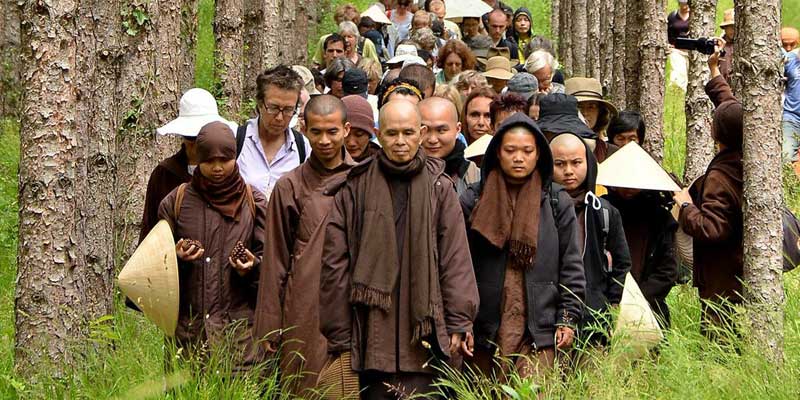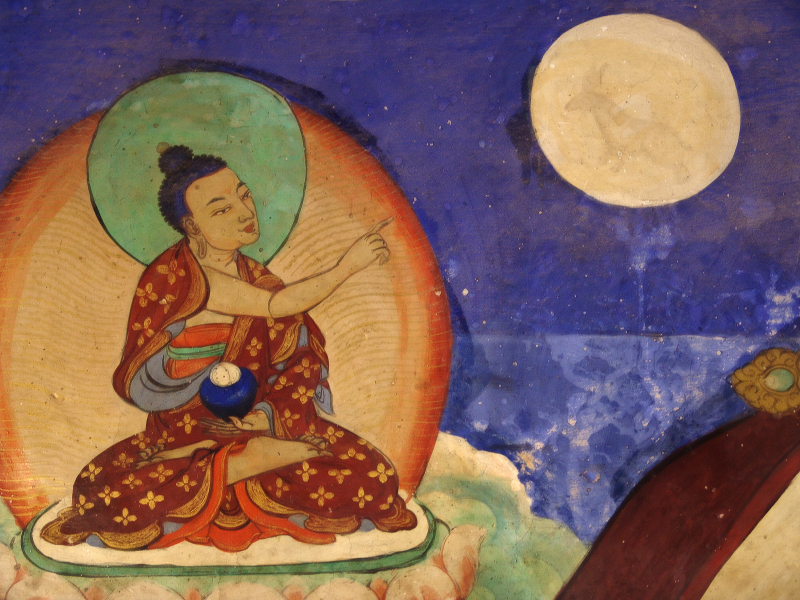Thich Nhat Hanh may no longer be with us today but his words will forever echo in the hearts of millions of people globally who had the chance of discovering him in person, through his lectures or even his books. A Zen Buddhist master, poet and spiritual teacher-Thich Nhat Hanh was rightly called an ‘apostle of peace’ by the likes of Martin Luther King Junior who both admired and invested immense faith in him in a world of conflict and endless violence.Both met during the 1960s when the war in Vietnam was drawing towards a closure after wrecking havoc in the lives of hundreds of men, women and children crushed under the boots of American imperialism.
Born in 1926 in a small Vietnamese village, he was ordained when he was just sixteen years old at the Tu Hieu temple. He was also went on to study a secular discipline at the university of Saigon which was quite rare for monks to do at that time. Thich Nhat Hanh was deeply impacted by the pain and suffering that he saw around during the Vietnam war and instead of secluding himself in an isolated haven of peace, he decided to help out the victims of the war while continuing his sacred practice of mindfulness and peace. It was during this time that he said “I saw communists and anti-communists killing and destroying each other because each side believed they had a monopoly on the truth, my voice was drowned out by the bombs, mortars and shouting”. Even during these times of sheer unrest and turbulence, he continued to serve his fellow human beings during what can be called a gross violation of human life and dignity.
A charismatic teacher, Thich Nhat Hanh lovingly known as Thay( the Vietnamese word for teacher),spent a couple of years teaching at the Princeton University and his courses on Comparative Religion there and Buddhism at Columbia University were widely popular among young researchers and students. Active on the political as well as the spiritual front, he also had a remarkable impact on Martin Luther King Jr. who was asked by him to speak against the atrocities being meted out by the Americans on Vietnam’s indigenous people. At the height of the war in Vietnam, he was exiled from his homeland as he was seen as a threat both by the Americans as well as the Communists. Thich Nhat Hanh’s religiosity was deeply embedded in his love for the suffering, the needy and the vulnerable and therefore when the monk was exiled, he spent several decades in France constituting monastic communities and meditation centres all over the West known fondly as the Plum Village Tradition. He was a teacher par excellence and what set him apart was his lucid communicative style and ability to embrace people with a life affirming positivity that could heal the most wounded heart. It was only in 2018 that the Vietnamese government allowed him to return back to his homeland and spend his final days at the Tu Hieu temple where he took his last breath. He saw the world undergo historic changes and moments that would change it forever including the coronavirus pandemic and unprecedented loss of life and livelihood that it brought about but his words of wisdom echo loud and clear helping us a to embark on a more spiritually enriched journey.
Thich Nhat Hanh wrote, ‘Hope is important, because it can make the present moment less difficult to bear, if we believe that tomorrow will be better, we can bear a hardship today.’
It would not be wrong to say that Thich Nhat Hanh was one of the most loved teachers of Buddhist wisdom in our times and it is because of him that many people around the world have learnt that it is not necessary to spend decades secluded on the mountaintop mediating in order to find peace or become enlightened in the shade of Buddhist wisdom. He opens our eyes and helps us realise that the simple yet extremely significant act of becoming aware of our breathing pattern and through that becoming aware of the present moment where even the ‘ordinary’ becomes ‘extraordinary’ or miraculous was a practice worthy of engaging in on the meditative path. Most of us tend to miss out on the beauty of the present moment because either we are invested in the past or too preoccupied with the future and so do not make the fullest out of the tremendous potential that the present moment holds. But if we follow Thich Nhat Hanh’s teachings and practice mindfulness we will gradually come to a state of being where anxiety and fear will disappear and a sense of timelessness will allow us to reach our highest qualities and cultivate the compassion, love and unbound kindness that is at the seed of our being. Thich Nhat Hanh will forever remain etched in our hearts as a teacher par excellence and his words will echo loud and clear in a world plagued by intolerance, environmental degradation, injustice and violation of human rights. And perhaps humanity will someday adhere to his appeal that one should walk as if kissing the earth with our feet and acknowledge like Thay would repeatedly tell us that the miracle is here and now where even the ordinary becomes extraordinary and the simplest of things become miraculous.













